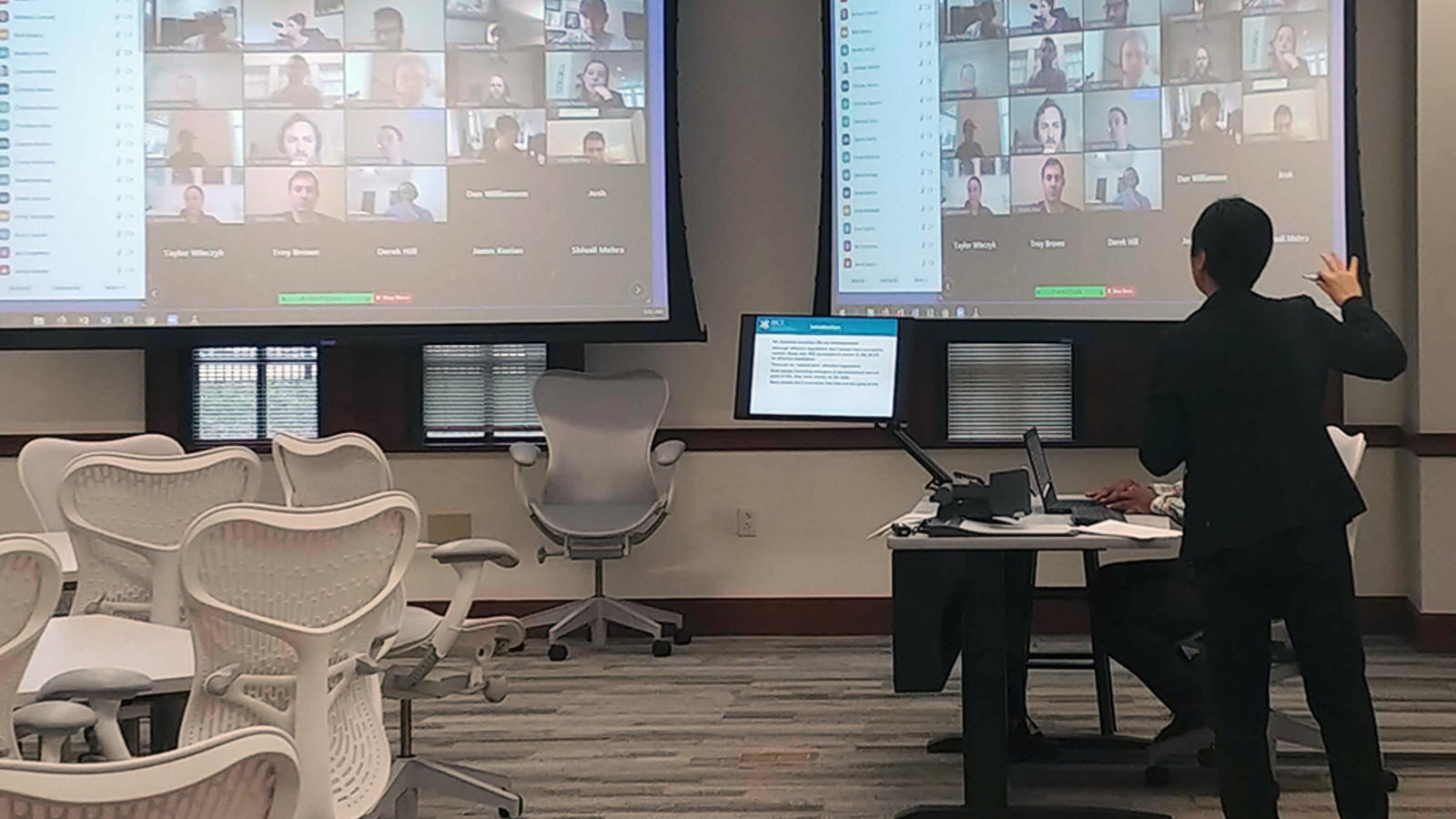Negotiating the new normal: How Jones School MBA course negotiated transition to online learning

The COVID-19 pandemic has shifted work, school and social lives online, demanding everyone leave their comfort zones of routine and predictability. Jing Zhou, a professor of management at Rice’s Jones Graduate School of Business who’s an organizational behavior expert, found herself stretching her creative muscles to convert an in-person MBA course to online.
Her course Negotiations is taught as an Intensive Learning Experience (ILE), which Zhou considers “the best way of closing the knowing-doing gap — the course helps (students) to not only understand and appreciate negotiation concepts and frameworks, but also use the concepts and frameworks as foundations for building and executing their strategies for a specific negotiation.”
The class is part of the professional MBA program at the Jones School, and students are working professionals. Typically they take the course on evenings or weekends, participating in back-to-back class days. During those two days, the students practice negotiation exercises and discuss or effective or ineffective strategies. Zhou says this ILE has been one of the “secret sauces in the program because of its rich content and rigorous pedagogy.”
These factors make the class seemingly impossible to convert to an online format. Nonetheless, to keep teaching in the current climate, the Jones School went forward with the originally scheduled dates (March 13 and 14) and moved the class online. It was a team effort — Zhou presented her teaching plan to colleagues from various departments who helped her figure out how to make it work.
Zhou chose to teach the class from one of the executive education classrooms at McNair Hall, home of the Jones School, because a remote teaching setup was already in place there. “When I teach, I like to walk around and write things on the board, and teaching in a real classroom allowed me to hold some things constant amongst a sea of change,” she said.
Given the nature of the class, the students virtually moved among small-group “breakout rooms” and the main “classroom.” They engaged in individual preparation, team preparation, negotiations of all sizes and configurations, and whole-class discussion.
Thanks to technology, the class continued almost unchanged. Zhou had to adjust the social aspects of teaching, like picking up on nonverbal cues from students. “When I can only see faces on a screen, I can’t read any nonverbal cues and, hence, the need to pose the same question in different ways, or repeat key takeaways to make sure they fully understand the course concepts and frameworks,” she said.
When Houston city leaders issued a stay-at-home order March 24, Zhou could no longer use the technology at the Jones School and had to convert her class to be even more remote for the next section on April 4 and 5.
“In the following days, I had tutorial sessions with IT and trial runs with a group of Jones School staff to practice various tech features,” Zhou said. “I had to go from a tech dummy who needed her teenage son’s help to set up a WhatsApp account, to someone who now feels pretty comfortable navigating various features in Zoom and syncing a laptop with (a Microsoft) Surface Pro to run a complex class.”
Due to the unusual circumstances, the Jones School offered students the option to attend online or postpone until they could take it in person. Twenty students out of the original 80 decided to participate online.
“Knowing it would be the smallest Negotiations ILE I’d ever taught, I didn’t know what to expect, and frankly was a bit worried about whether the quality of discussion would meet Rice Business’ high standards,” Zhou said.
But it worked. Students were engaged and actively participated, even with Zhou changing her teaching style.
“Sitting at home in front of a couple of computers is not my preference; I draw energy from walking around,” she said. “So knowing I would have to sit and teach, I needed to energize myself psychologically. I dressed up as if I were teaching in the classroom. This helped me to activate my professional identity, and generate psychological energy to do a great job. In addition to a teaching plan, I also created a very detailed class timeline and shared it, in advance, with all students. I felt this helped us to use time efficiently.”
Studies have found that physical settings influence cognitive thinking, according to Zhou, and the change of physical settings could affect divergent thinking and new insights. So, she theorized, it may be beneficial to blend online classes with face-to-face instruction to encourage new thinking.
As people adjust to stay-at-home measures, she notes, they’re searching for ways to encourage motivation and creativity.
“I hope this experience makes people aware that being creative requires much more than telling oneself ‘be creative now,’” Zhou said. “There are strategies that facilitate idea generation, idea evaluation and idea implementation, but most people have never learned those skills and could get frustrated easily after they realize their efforts at forcing creative do not produce great ideas or projects.”
Her advice isn’t just for those who are acclimating to working from home or those attempting a new passion project, but also for organizations.
“I believe people who are willing to learn will realize there are existing processes that need improvement,” she said. “Leaders will need to analyze which part of their existing processes are not efficient and need to be eliminated — and they should use creative thinking skills to engage in process innovation.”